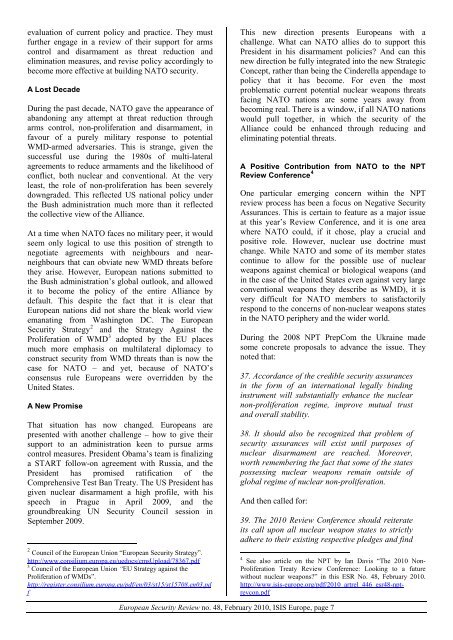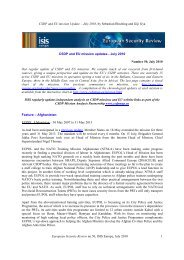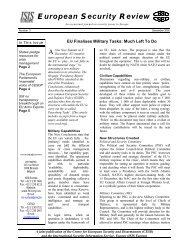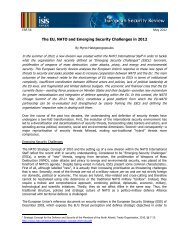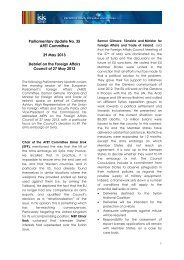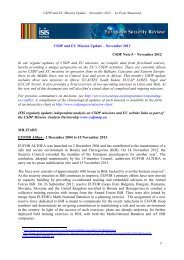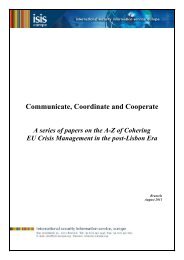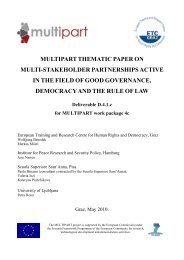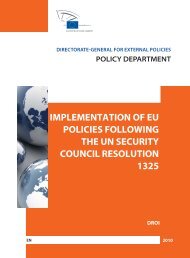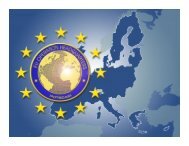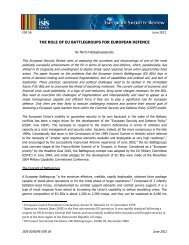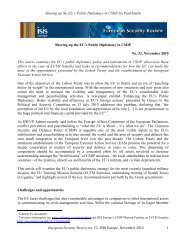ISIS Europe News In This Issue
ISIS Europe News In This Issue
ISIS Europe News In This Issue
You also want an ePaper? Increase the reach of your titles
YUMPU automatically turns print PDFs into web optimized ePapers that Google loves.
evaluation of current policy and practice. They must<br />
further engage in a review of their support for arms<br />
control and disarmament as threat reduction and<br />
elimination measures, and revise policy accordingly to<br />
become more effective at building NATO security.<br />
A Lost Decade<br />
During the past decade, NATO gave the appearance of<br />
abandoning any attempt at threat reduction through<br />
arms control, non-proliferation and disarmament, in<br />
favour of a purely military response to potential<br />
WMD-armed adversaries. <strong>This</strong> is strange, given the<br />
successful use during the 1980s of multi-lateral<br />
agreements to reduce armaments and the likelihood of<br />
conflict, both nuclear and conventional. At the very<br />
least, the role of non-proliferation has been severely<br />
downgraded. <strong>This</strong> reflected US national policy under<br />
the Bush administration much more than it reflected<br />
the collective view of the Alliance.<br />
At a time when NATO faces no military peer, it would<br />
seem only logical to use this position of strength to<br />
negotiate agreements with neighbours and nearneighbours<br />
that can obviate new WMD threats before<br />
they arise. However, <strong>Europe</strong>an nations submitted to<br />
the Bush administration’s global outlook, and allowed<br />
it to become the policy of the entire Alliance by<br />
default. <strong>This</strong> despite the fact that it is clear that<br />
<strong>Europe</strong>an nations did not share the bleak world view<br />
emanating from Washington DC. The <strong>Europe</strong>an<br />
Security Strategy 2 and the Strategy Against the<br />
Proliferation of WMD 3 adopted by the EU places<br />
much more emphasis on multilateral diplomacy to<br />
construct security from WMD threats than is now the<br />
case for NATO – and yet, because of NATO’s<br />
consensus rule <strong>Europe</strong>ans were overridden by the<br />
United States.<br />
A New Promise<br />
That situation has now changed. <strong>Europe</strong>ans are<br />
presented with another challenge – how to give their<br />
support to an administration keen to pursue arms<br />
control measures. President Obama’s team is finalizing<br />
a START follow-on agreement with Russia, and the<br />
President has promised ratification of the<br />
Comprehensive Test Ban Treaty. The US President has<br />
given nuclear disarmament a high profile, with his<br />
speech in Prague in April 2009, and the<br />
groundbreaking UN Security Council session in<br />
September 2009.<br />
2 Council of the <strong>Europe</strong>an Union “<strong>Europe</strong>an Security Strategy”.<br />
http://www.consilium.europa.eu/uedocs/cmsUpload/78367.pdf<br />
3 Council of the <strong>Europe</strong>an Union “EU Strategy against the<br />
Proliferation of WMDs”.<br />
http://register.consilium.europa.eu/pdf/en/03/st15/st15708.en03.pd<br />
f<br />
<strong>This</strong> new direction presents <strong>Europe</strong>ans with a<br />
challenge. What can NATO allies do to support this<br />
President in his disarmament policies? And can this<br />
new direction be fully integrated into the new Strategic<br />
Concept, rather than being the Cinderella appendage to<br />
policy that it has become. For even the most<br />
problematic current potential nuclear weapons threats<br />
facing NATO nations are some years away from<br />
becoming real. There is a window, if all NATO nations<br />
would pull together, in which the security of the<br />
Alliance could be enhanced through reducing and<br />
eliminating potential threats.<br />
A Positive Contribution from NATO to the NPT<br />
Review Conference 4<br />
One particular emerging concern within the NPT<br />
review process has been a focus on Negative Security<br />
Assurances. <strong>This</strong> is certain to feature as a major issue<br />
at this year’s Review Conference, and it is one area<br />
where NATO could, if it chose, play a crucial and<br />
positive role. However, nuclear use doctrine must<br />
change. While NATO and some of its member states<br />
continue to allow for the possible use of nuclear<br />
weapons against chemical or biological weapons (and<br />
in the case of the United States even against very large<br />
conventional weapons they describe as WMD), it is<br />
very difficult for NATO members to satisfactorily<br />
respond to the concerns of non-nuclear weapons states<br />
in the NATO periphery and the wider world.<br />
During the 2008 NPT PrepCom the Ukraine made<br />
some concrete proposals to advance the issue. They<br />
noted that:<br />
37. Accordance of the credible security assurances<br />
in the form of an international legally binding<br />
instrument will substantially enhance the nuclear<br />
non-proliferation regime, improve mutual trust<br />
and overall stability.<br />
38. It should also be recognized that problem of<br />
security assurances will exist until purposes of<br />
nuclear disarmament are reached. Moreover,<br />
worth remembering the fact that some of the states<br />
possessing nuclear weapons remain outside of<br />
global regime of nuclear non-proliferation.<br />
And then called for:<br />
39. The 2010 Review Conference should reiterate<br />
its call upon all nuclear weapon states to strictly<br />
adhere to their existing respective pledges and find<br />
4 See also article on the NPT by Ian Davis “The 2010 Non-<br />
Proliferation Treaty Review Conference: Looking to a future<br />
without nuclear weapons?” in this ESR No. 48, February 2010.<br />
http://www.isis-europe.org/pdf/2010_artrel_446_esr48-nptrevcon.pdf<br />
<strong>Europe</strong>an Security Review no. 48, February 2010, <strong>ISIS</strong> <strong>Europe</strong>, page 7


